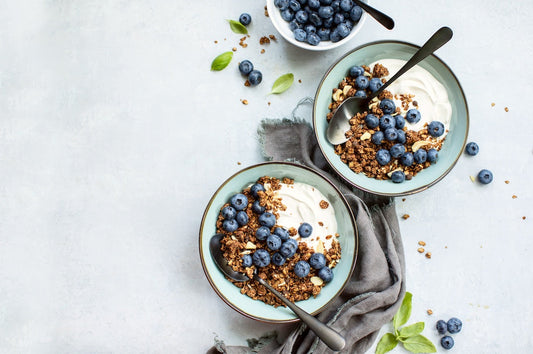There are all kinds of diets – low carb, keto, intermittent fasting, detox and many more. Behind every diet myth is the promise of rapid weight loss, a new body image and more energy. But what do diets really achieve? And do they work in the long term? In this article, we will answer these questions once and for all.
Healthy breakfast – discover ideas and recipes here
What actually is a diet?
The term ‘diet’ comes from the Greek diaita and originally meant ‘way of life’ or ‘lifestyle’. It referred to much more than just a particular diet. Rather, it was about the entire lifestyle, including not only nutrition but also exercise, sleep and mental well-being.
In today's language, however, the meaning of the term has changed considerably: when people talk about a ‘diet’, most think of a short-term measure to lose weight, which often involves certain rules, restrictions or lists of forbidden foods. Often, the focus is on calorie restriction, avoiding certain food groups or a strict eating schedule.
Less well known, but no less relevant, are medically necessary diets that have nothing to do with the desire to lose weight. They are used, for example, for:
- Food intolerances (e.g. gluten-free diet for coeliac disease or low-lactose diet for lactose intolerance)
- Metabolic disorders (e.g. ketogenic diet for epilepsy or low-protein diet for certain liver disorders)
- Cardiovascular diseases (e.g. low-cholesterol diet for those at increased risk of cardiovascular disease)
- Diabetes mellitus, where, for example, carbohydrate intake must be carefully controlled
These types of diet are usually followed under medical or nutritional supervision and have a therapeutic goal. They should not be confused with short-term weight loss trends that are advertised in magazines, on social media or in diet apps.
In this article, we will focus on these popular diets and ask: What do they really achieve, and are there alternatives that are healthier and more sustainable in the long term?
What types of diet are there?
There is a wide variety of diets, and with each new nutrition trend, another method seems to be added. The following are among the best-known types of diet that are often recommended or advertised for weight loss:
- Low carb/keto: This diet drastically reduces or almost completely eliminates carbohydrates. Instead, it focuses on high-fat and protein-rich foods. While the ketogenic diet has particularly strict rules, a classic low-carb diet allows more leeway.
- Intermittent fasting: This method is not based on a particular choice of food, but on the timing of food intake. Popular variants of intermittent fasting include 16:8 (fast for 16 hours, eat for 8 hours) or 5:2 (five normal, two heavily reduced calorie days per week).
- Paleo: The so-called ‘Stone Age diet’ is based on the presumed diet of our ancestors. It mainly allows meat, fish, vegetables, fruit and nuts. Cereal products, legumes and processed foods are avoided.
- Detox diets: These diets are based on temporary abstinence, usually in the form of juices, smoothies or soups, to ‘purify’ or ‘detoxify’ the body. However, this effect has not been scientifically proven.
- Food combining: Here, certain nutrients – especially proteins and carbohydrates – are not consumed together, as they are supposedly digested differently. The health benefits of this separation are controversial.
- Formula diets: With this type of diet, meals are replaced either completely or partially by shakes, bars or soups that are precisely portioned and reduced in calories. These diets can lead to short-term weight loss, but are often difficult to integrate into everyday life.
What all these diets have in common is that they promise quick results. They are often advertised with before-and-after pictures and clear instructions. But that's exactly where the danger lies: what's quick is rarely sustainable. Many of these programmes are difficult to sustain in the long term, are very restrictive or neglect important aspects of a balanced diet.
How does weight loss really work?
To lose weight, you basically need a calorie deficit, i.e. you need to consume less energy than your body uses during the course of the day. This principle applies regardless of the chosen form of diet. However, while this may sound simple, in reality it is highly individual and depends on many factors.
How many calories do I need?
The daily calorie requirement is made up of the basal metabolic rate (energy consumption at complete rest) and the active metabolic rate (e.g. through exercise, sport, everyday activities). This requirement is influenced by, among other things:
- Age
- Gender
- Height and weight
- muscle mass
- activity level
A practical tool for orientation is the calorie calculator from Verival, with which you can quickly and easily calculate your personal needs.
Calculate your calorie requirement with the Verival calorie calculator.
Why ‘eating less’ is not always better
If you eat too little for your calorie requirement, you may achieve rapid weight loss, but this can be at the expense of muscle mass and slow down your metabolism in the long term. The body often reacts to extreme calorie restriction by going into energy-saving mode, which makes further weight loss more difficult.
A healthy calorie deficit is usually around 300-500 calories a day. However, it is much more important than the exact number that the diet remains balanced, nutritious and suitable for everyday use.
The yo-yo effect – why many diets don't work
Many people are familiar with it: the dreaded yo-yo effect. You go on a diet, lose weight, and then a short time later, the weight is back. Often you even weigh more than before. Researchers Dulloo & Montani (2015) found that many people gain back a large portion of the lost weight within a year after dieting. After five years, almost all of them have regained their old weight or even more.
This is because our body switches to ‘economy mode’ after a diet. It then consumes less energy, breaks down muscle and stores fat again particularly quickly – in case there is another period of hunger. Particularly difficult: the body often rebuilds fat faster than muscle, which means that after a diet you have a higher body fat percentage than before.
The psyche also suffers. Strict rules, constant calorie counting and a guilty conscience for small ‘sins’ can lead to cravings and uncontrolled eating. Even people of normal weight who just want to lose a few kilos put themselves at a higher risk of becoming overweight later on.
What really helps: a sustainable change in diet
Instead of short-term diet plans, experts recommend a long-term change in eating habits that can be easily integrated into everyday life and is not based on deprivation.
This means:
- Regular meals with complex carbohydrates, proteins and healthy fats
- Lots of vegetables, wholemeal products, legumes and nuts
- Mindful eating instead of calorie counting
- A healthy approach to luxury foods (e.g. chocolate is not forbidden!)
A good example of a healthy start to the day is a balanced breakfast, such as warm porridge with nuts, fruit and plant-based milk. It keeps you full for a long time, provides important micronutrients and ensures stable blood sugar levels.
Basic oat porridge recipe
Ingredients
- 250 ml of milk or a plant-based alternative for vegans (oat milk, almond milk, soy milk, etc.)
- 50 g of oats (grams of oats)
- 1 pinch of salt
- 2 teaspoons of agave syrup (optional)
- 1/2 teaspoon of cinnamon (optional)
Preparation
- Bring the oats to the boil with a pinch of salt and the sweetener of your choice in the milk or vegetable drink (ideally stirring constantly). Cooking the cereal flakes with just hot water is also an option.
- Leave the porridge to stand for 3 minutes.
- Empty the porridge into a bowl and sprinkle with cinnamon.
- Enjoy!
Nutritional information
Calories: 320 kcal
Porridge recipe Basic recipe
Conclusion: no diet can replace a balanced lifestyle
Diets are rarely the solution, at least not in the long term. Much more important than rapid weight loss is a diet that nourishes, does you good and gives you pleasure.
It's not about eating perfectly, but about making conscious decisions that are compatible with your own life. If you want to make a long-term change, you don't need a diet, but a way of life that is both healthy and enjoyable.
Porridge from Verival – Try it now!
Frequently asked questions
Is a diet really effective?
Diets can lead to short-term weight loss, but are rarely effective in the long term. Often, weight is gained again after the diet if there is no permanent change in diet.
Is the yo-yo effect a myth?
No, the yo-yo effect has been scientifically proven. The body reacts to diets by using less energy and building up more body fat, which often causes the weight to rise again after the diet.
What is the most effective diet?
The most effective ‘diet’ is not a diet, but a long-term, balanced nutrition. Regular, nutrient-rich meals, enjoyment without prohibitions and a healthy approach to food are more sustainable than any short-term weight loss method.
























